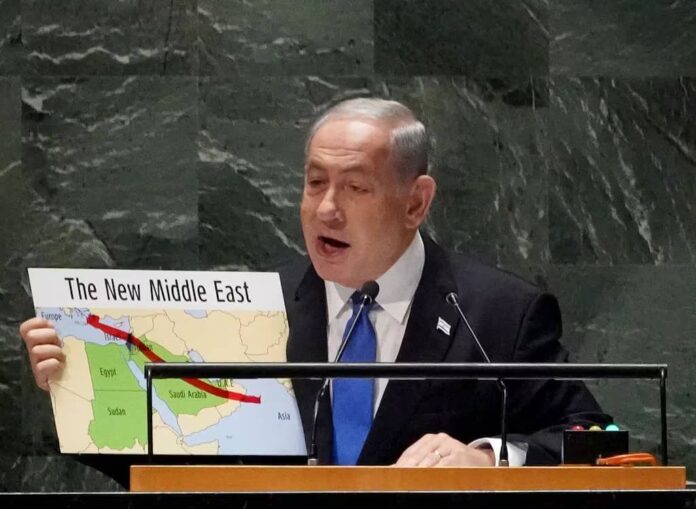Can Israel destroy Iran’s nuclear facilities by itself?
US President Joe Biden was clear when asked this week whether he would support an Israeli strike on Iran’s nuclear facilities: “The answer is no.” Despite Biden’s response, some Israeli hawks have been discussing the possibility of launching an attack after Iran launched a barrage of 180 ballistic missiles into Israel.
However, a solo Israeli air strike on Iran’s nuclear facilities would be highly challenging and risky, according to military analysts. Even if it were successful, they believe it would likely only delay Iran’s nuclear program rather than completely destroy it.
*Challenges for Israel*
One of the main difficulties Israel would face is the long distance between Israel and Iran’s main nuclear bases, more than 1,600 kilometers away. Israeli jets would have to cross multiple countries’ airspace, including Saudi Arabia, Jordan, Iraq, and possibly Turkey. Any such mission would require extensive aerial refueling, leaving little margin for error.
Fuel consumption is a critical issue. According to a US Congressional Research Service (CRS) report, the round-trip to Iran would consume most of Israel’s air force’s refueling capacity. Additionally, Iran’s nuclear facilities are heavily protected by advanced air defenses, so the attacking planes would require significant fighter escort.
A strike of this magnitude would demand a large force. The CRS report estimates that Israel would need a strike package of around 100 aircraft, representing almost a third of the Israeli air force’s combat-capable planes.
*Defenses Around Iran’s Nuclear Sites*
The two main targets for Israel, Iran’s nuclear facilities at Natanz and Fordow, present considerable challenges. Natanz is located deep underground, and Fordow is even more secure, buried inside a mountain. Destroying these heavily fortified sites would require specialised weapons capable of penetrating deep into the earth and reinforced concrete.
Israel does possess powerful bunker-buster bombs, like the GBU-31 bombs that were used last week in an operation targeting Hezbollah’s leader, Hassan Nasrallah. However, analysts say that even 80 of these bombs were used, as they were in the Beirut strikes, they would not be sufficient to take out Iran’s fortified nuclear sites.
The only conventional bomb believed capable of penetrating Iran’s defenses is the US-made GBU-57A/B Massive Ordnance Penetrator (MOP). This enormous precision-guided bomb weighs 13,000 kg and can penetrate 60 meters of earth before detonating. However, Israel does not have this weapon, and even if it did, its aircraft are not capable of carrying it.
*Israeli Bombing Capabilities*
Even though some experts have suggested that the US should supply Israel with the MOP bomb, there are no indications that this has happened. Furthermore, even if Israel could obtain the bomb, it lacks a strategic bomber like the B-2 Spirit, which is needed to deliver it.
In theory, Israel could use one of its Hercules C-130 transport planes to drop a MOP bomb through its cargo doors in a maneuver known as a “ramp drop.” However, this is not the intended delivery method for the MOP and would be a complicated and less precise operation.
Other options for Israel
If a direct strike isn’t feasible, Israel could attempt to disable the facilities indirectly by targeting critical infrastructure such as air intakes. This might disrupt the precision needed for the centrifuges that enrich uranium, potentially halting operations temporarily. However, such damage wouldn’t permanently destroy Iran’s nuclear capability.
*Sabotage is another option*
Israel has been suspected of carrying out such operations in the past. For example, in 2021, a power outage—believed to have been caused by a planned explosion—hit the Natanz facility, temporarily disrupting uranium enrichment. In 2010, the Stuxnet computer virus, reportedly developed by Israel and the US, delayed Iran’s nuclear progress. Yet, these acts of sabotage have only succeeded in delaying, not halting, Iran’s nuclear ambitions.
The consensus among military analysts is that Israel would struggle to destroy Iran’s nuclear facilities without US support. As Darya Dolzikova and Matthew Savill from the Royal United Services Institute (RUSI) note in a recent paper, the scale of force required would likely require significant US assistance, if not direct involvement. Even with US support, achieving the complete destruction of Iran’s nuclear program is far from guaranteed. Therefore, while Israel could attempt a solo strike, the risks and challenges make success highly uncertain.
Follow the Neptune Prime channel on WhatsApp: https://whatsapp.com/channel/0029Va74ZvU2v1IqKByXoX3d
Do you have breaking news, interview request, opinion, suggestion, or want your event covered? Email us at neptuneprime2233@gmail.com



If the Israel attempt this, what would be the Iranian response? Iran has details of Israel critical facilities including nuclear weapons locations.